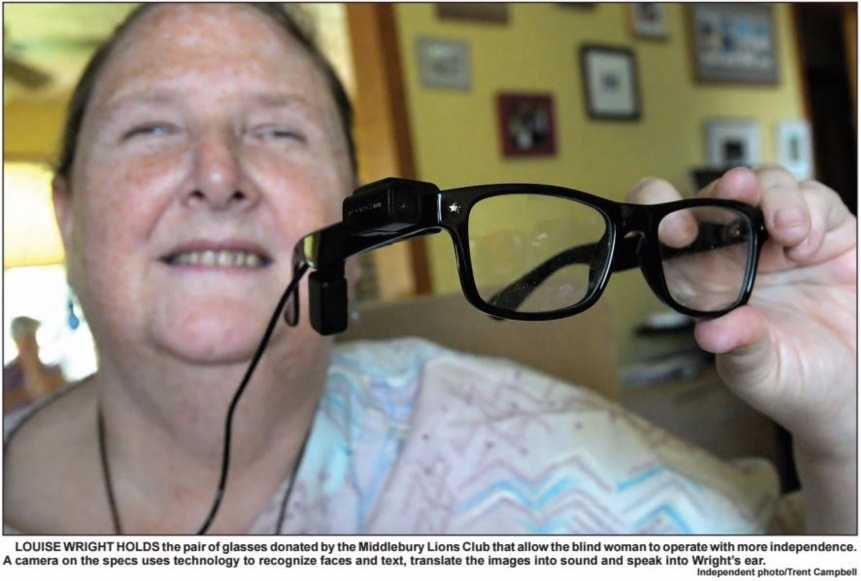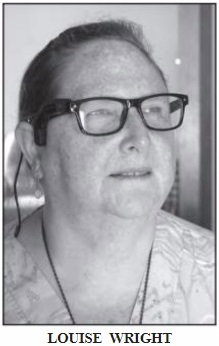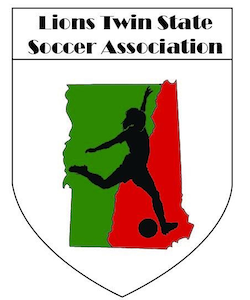Story reposted from the 7/10/17 edition of the Addison Independent
Courtesy of the Addison Independent
By Will Digravio
 High-tech glasses help blind woman ‘see’
High-tech glasses help blind woman ‘see’
Lions gift restoring her independence
Thirty years ago, Louise Wright was told she would become blind. Four years ago, she did lose her sight completely, and began training herself to live as fully as possible in her new world of darkness. Thanks to a unique piece of technology she received, the Middlebury woman is regaining some measure of independence.
In 1987, Wright, now 58, was diagnosed with chronic idiopathic panuveitis, a rare disease she described as “arthritis of the eye.” Typically, those who develop panuveitis are able to treat the inflammation it causes with steroids, however, since her’s was chronic, there was nothing that a variety of treatments from countless doctors could do. Wright just had to live with it. On some days, her vision would be fine, while during others, she could barely see her hand and would feel as though she were looking through a fog. “(Inflammation) would come and go, and each time it would come it would damage different parts of the eye,” she said.
 Wright was able to fight through the disease and work as a Registered Nurse in Burlington for 26 years. But eventually her loss of vision reached a point that she could no longer work. In the summer of 2013, Wright suffered from an inflammation that, unlike past flare-ups, did not subside, it grew worse each day. By the fall, she could no longer see people’s faces. By December, she could barely differentiate night from day. She became legally blind. In March of 2014, she fell down a flight of stairs and hit her head, causing a hemorrhage and the complete dislocation of her retinas.
Wright was able to fight through the disease and work as a Registered Nurse in Burlington for 26 years. But eventually her loss of vision reached a point that she could no longer work. In the summer of 2013, Wright suffered from an inflammation that, unlike past flare-ups, did not subside, it grew worse each day. By the fall, she could no longer see people’s faces. By December, she could barely differentiate night from day. She became legally blind. In March of 2014, she fell down a flight of stairs and hit her head, causing a hemorrhage and the complete dislocation of her retinas.
More than three years later, Wright is still adjusting. “I thought I was preparing myself for going blind but (I) really didn’t have any idea,” she said. “I didn’t take braille. I didn’t do anything I should have.” For Wright, one of the hardest places to lose that independence was at the Congregational Church of Middlebury, where she could no longer see the faces of her fellow community members, let alone read the church’s bulletin. “When you become blind, the biggest thing you lose is independence,” she said. “I used to be able to do whatever I wanted to. Everything is dependent on someone else being available to read to me, to drive me somewhere, to help me with this or that.”
After she became completely blind, Wright began attending trainings and workshops that taught her how to adjust. She said her husband Jim, was committed to finding technologies or practices that may help her be more independent. After hours of research, he finally found a piece of technology that could help his wife: an OrCam. Produced by a company of the same name in Israel, OrCam is a small camera that attaches to a pair of eyeglasses; it translates visual information into spoken words. The device can recognize faces, read text and identify certain products and then, using a small speaker positioned just above the wearer’s ear, tell them who they’re seeing, what they’re reading, or what’s on the shelf in front of them. In essence, it provided the benefits of sight to those who cannot truly see. When they found the device online, the Wrights were amazed by the tecjnology and looked into buying one. However, one thing stood in their way: a $3,500 price tag. “There is no way we can afford this device,” Louise Wright said at the time.
THE LIONS STEP IN Since its founding in 1917, the Lions Clubs have completed thousands of community service projects across the country and world. One of the club’s more well known missions is to provide service to those who are visually or hearing impaired. Knowing the mission of the organization, the Wrights approached the Middlebury Lions Club last year and asked if it could assist in funding the OrCam. To their surprise, the 72 members of the club took a vote and decided to fund the device in full.
Wright could not believe their generosity. “I started crying. I couldn’t believe that they would agree to pay for this,” she said. Now with the help of the device, Wright says she is slowly starting to regain the independence that she lost. One aspect that has been particularly important to her is being able to recognize who is speaking to her at church. “It blows people away when they come up to me and I can say, ‘Hi, George’ and they go, how did you know it was me? I tell them I’m magic.” She said with a laugh.
SERVING THEIR COMMUNITY Randy Bigelow is one of the Lions Club members who was moved by Wright’s story and worked to make the gift to her. Bigelow, who is the club’s past president and current membership chair, worked alongside club Sight and Hearing Chairman Keith Meyer to make it happen. “Keith was intrigued. He did a little research and came to the club and said, here’s our opportunity to help a local resident,” Bigelow said.
Of all the donations the Lions have made in the last year, Bigelow said Wright’s story moved him the most. “We’re all human. For me, to sit in a room with a woman who looks at you with pride and says, I’m really freaking out the folks in church because I’m reading the church bulletin and my friends walk up to me and I can say how are you doing – that’s amazing,” he said. “You’d have to be inhuman not to be touched by that.”
Each year, the Middlebury Lions club allocates more than $7,000 for sight and hearing-related initiatives. This year, the club donated 33 corrective glasses and three hearing aids to local individuals. They also recycled 1,220 pair of eyeglasses and 17 hearing aids, many of which will end up in the hands of needy people all around the world. Much of the same work is also done in other Lions Clubs throughout Addison County, such as the Brandon-Forestdale and Vergennes Lions Clubs.
Each year, these clubs partner to support the Green Mountain Lions Camp, which, for more than 30 years, has brought together deaf and hard of hearing kids and teenagers from all over New England. This year, Bigelow said that 25 teenagers age 13 and older have signed up for the teen session that runs from July 9-21, 2017. And 14 campers, age 8 to 13, have signed up for the youth session that runs from July 23-29, 2017. This year, the Middlebury Lions donated $1,000 to the camp. More recently, the club has partnered with the Addison Central School District to conduct eye screenings for children. Using Welch Allyn SPOT vision screener cameras that were purchased by the Lions Clubs of Vermont, volunteers screened 1,341 local students after visiting every school in the district. These screenings take 60 seconds, and provide initial eye health indicators that parents can then share with their optometrist. Bigelow said that this is all a part of the Lions’ mission to serve their community. The club meets on the first and third Mondays of the month from October through June [at Rosie’s Restaurant].
For more information on the OrCam


